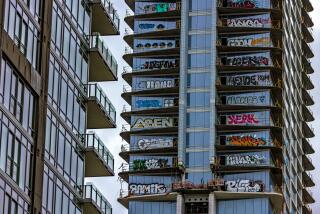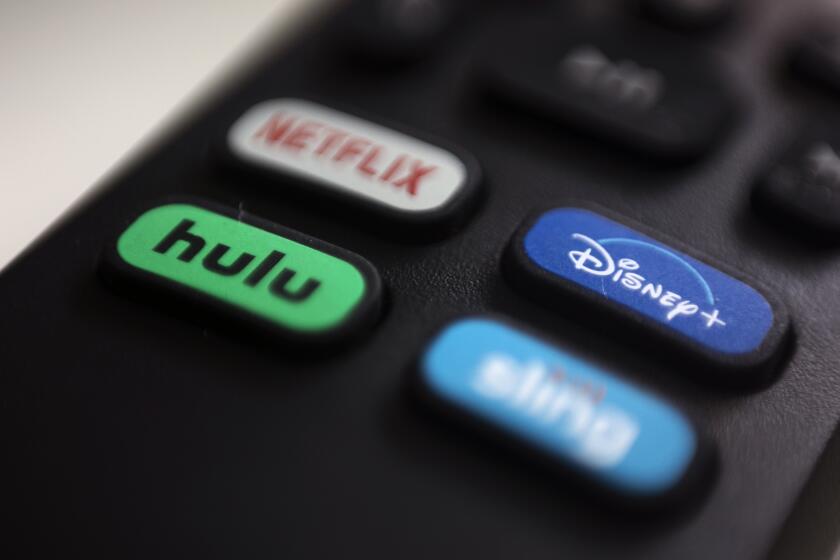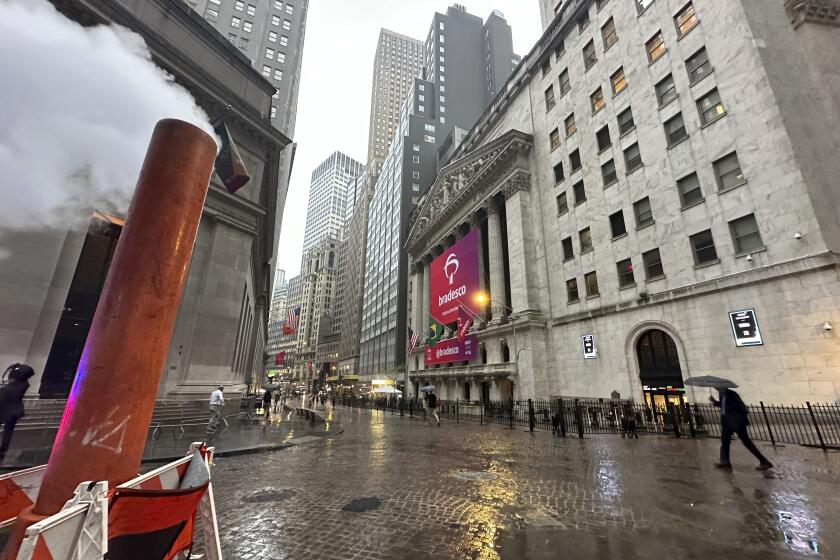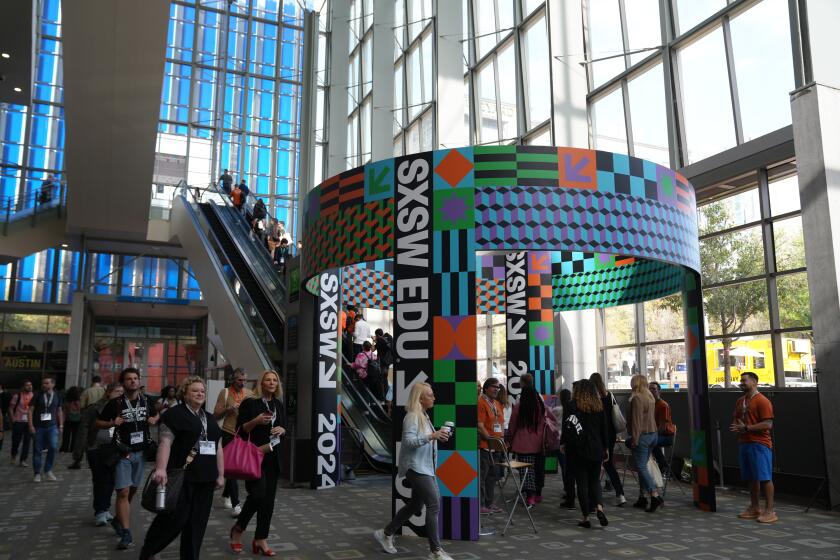Rejections of Emergency SBA Loans Irk Companies
A federal program to provide emergency loans to small businesses whose revenues have been hurt by the terrorist attacks has come under fire from business owners who say it is too restrictive to offer widespread help.
In mid-October, the Small Business Administration took the unprecedented step of expanding its Sept. 11 loan program to include businesses around the country that can prove their economic woes stem from the attacks.
But since the expansion, the agency has rejected more applicants than it has approved--443, or 58% of the applications reviewed, have been declined and 323, or 42%, approved. And most businesses were turned down because they failed the direct-connection test.
“If you strictly limit it to businesses with a very clear, direct impact, you just knock a whole lot of people out of the running,” said Roberto Barragan, president of the Valley Economic Development Center, a small-business assistance group that has helped several business owners apply for loans--only one of which has been approved.
The SBA said its “adjusted” approval rate is 64%--that is, the percentage of loans it has approved based on the applicants’ credit histories and abilities to repay. That rate does not include applicants turned down for a variety of other reasons, including failure to meet the direct-connection requirement.
Damon Dozier, director of government and public affairs for National Small Business United, said he thinks the SBA is doing a “wonderful job” but believes the loan program doesn’t go far enough.
His organization and other business groups are backing the American Small Business Emergency Relief and Recovery Act of 2001 (SB 1499), introduced in early October by Sens. John F. Kerry (D-Mass.) and Christopher S. Bond (R-Mo.).
Now stalled in the Senate, the measure would offer low-interest or no-cost recovery loans, venture capital incentives, the waiver of some loan fees and deferment of principal payments.
It also would apply to small businesses affected indirectly by the terrorist attacks. That would include suppliers and service providers in an industry complementary to any affected industry, especially finance, hospitality, travel and tourism.
“The SBA disaster-loan program is one of the government’s biggest success stories,” said Rep. Nydia M. Velazquez (D-N.Y.), who has been pushing for passage of a small-business assistance package in the House.
“But the program was not designed to cope with this scale of demand. It has done everything it can do. It is time to confront a new reality and develop tools for a new era.”
Sen. Jon Kyl (R-Ariz.) complained that the Kerry measure would relax lending rules, which could increase small-business loan defaults.
While the bill languishes in Washington, business owners who don’t qualify for an SBA loan are wondering what to do.
Hundreds of Companies Apply for Assistance
As of early December, the SBA had received 1,544 applications for loans under the emergency program--the first time the agency’s emergency disaster-loan effort was applied nationwide. Many of the applications are under consideration. The 323 loans approved total $26.12million in low-interest loans. (That does not count funds made available to firms in New York and Northern Virginia under separate government programs.)
At least $50,000 of that money will go to El Cajon-based Alliance Coatings Inc., which supplies paint to the major airlines. Company President Brian McKune considers himself an indirect victim of the attacks because grounded airplanes need less maintenance.
“Orders? We’re not getting any,” said McKune, who estimated his business has lost about $250,000 since Sept. 11. “And the ones we had are on slow payment terms.”
Without SBA assistance, he said, “we would have had to struggle.”
David Solomon, vice president of Marina del Rey-based Overwear Inc., was not among the lucky ones.
He sees a direct link between the attacks and the downward slide of his 13-year-old business. He said the drop in tourism linked to the September attacks has hit his business hard. The company makes logo-adorned T-shirts, sweats and other clothing sold at tourist sites such as Las Vegas, Walt Disney World and Universal Studios.
October sales were about $550,000.
“Normally, we should be doing twice that,” Solomon said. “It should have been $850,000 at least. People canceled orders; people postponed orders. I haven’t gotten an order since Sept. 11.”
But the SBA turned down his request for a $500,000 loan, saying he had not proved he was a victim of the attacks.
Some shop owners, the SBA said, are casualties of the general economic downturn.
“The program itself cannot cover the general economic downturn that unfortunately many small businesses are experiencing,” said Rick Jenkins, a spokesman for the SBA’s disaster-assistance program.
The loans are available to small firms that fall into at least one of the following categories and can prove that their business:
* Was in an airport or other facility that was closed, or where business was disrupted as a result of government security measures.
* Supplied or provided services to a business in or near the World Trade Center or the Pentagon, or to an industry adversely affected by damage to the trade center, the Pentagon or by subsequent federal action such as airport closures.
* Was dependent on a business or organization that closed, suspended its operations or was otherwise disrupted by the attack or federal action.
* Was otherwise directly affected by the attacks or by government action taken from Sept. 11 to Oct. 22, when the nationwide expansion took effect.
Tourism-dependent Florida has fared the best in the SBA loan derby. The state has submitted the most applications (426), followed by California (157). Florida has had the most loans approved (123), and the largest loan total ($6.99 million).
Disparity Between States That Depend on Visitors
California, by comparison, has had only 17 loans approved for a total of $1 million, with an average loan size of $59,147. Applications from 67 California firms, or about 80%, were rejected, a substantially higher rate than the national average rejection rate of 58%.
SBA officials acknowledged that some California firms have been severely affected by the attacks. Jenkins said that’s particularly true near the Mexican border, where some shop owners have seen customer traffic drop because of the long waits to cross the border as a result of increased security measures.
“Businesses on the American side of the border are suffering,” Jenkins said. “Those businesses are going to need financial help.”
Location May Not Be Grounds for Loan
More tenuous is the case of the retailer in a mall or near a tourist attraction that’s seen business plummet since the attacks.
“If you’re a business owner in a mall, [customer] fear of being in a mall now is not going to meet the criterion of a direct relationship,” said Herbert Mitchell, associate administrator for disaster assistance for the SBA.
Daniela Schnebly, owner of D.S.L.A., a small Santa Monica-based shop that produces trendy home and fashion accessories for retailers, was among those turned down, though she has reapplied.
When she was rejected for the $40,000 loan she sought she said it felt “like a knife in the back.”
Some of Schnebly’s biggest clients--including Urban Outfitters and TJX Cos., owner of the T.J. Maxx chain--have retail outlets near the rubble that once was the World Trade Center. After the attacks, she said, several of her clients, including those two, cut orders back to almost zero.
“The disaster is directly related to their sales figures, which are directly connected to their buying decisions, which is directly related to me,” she said.
A TJX spokeswoman said the company put off making purchases for about three weeks after the attacks but has since returned to the market.
A spokeswoman for Urban Outfitters said that sales at the company’s 47 stores generally have been good, and that the company did not make significant changes in order placements.
Schnebly said she was relying on information from her contacts within those firms, and stands by her view that business suffered because of the terrorist attacks.
“Sales were down before Sept. 11, yes; that’s just the business cycle,” she said. “But there’s a difference between getting fewer orders and getting no orders. Clearly, there’s no reason other than these acts of terrorism.
“We really need that money to stay in business. Without it? Basically we’d have to shut down.”
*
(Begin Text of Infobox)
SBA Emergency Loan Program
The 20 states with the highest and lowest proportion of loans approved under the Small Business Administration’s Sept. 11 emergency loan program, as of Dec. 1 (counting only states in which SBA made at least five loan approvals or declines).
Top 10 Approval rate Average dollar amount
Michigan 71% $28,240
Ohio 64 47,200
New Hampshire 57 73,675
Georgia 57 79,877
New York 56 94,340
Illinois 55 37,136
Florida 54 56,856
North Carolina 50 81,357
Maine 50 38,475
South Carolina 50 128,233
*
Bottom 10 Approval rate Average dollar amount
Nevada 7% $12,300
Arizona 11 13,700
Louisiana 20 135,800
Connecticut 20 244,200
Missouri 20 101,400
Mississippi 20 45,300
California 20 59,147
Virginia 25 65,500
Oregon 27 43,267
Maryland 29 88,425






